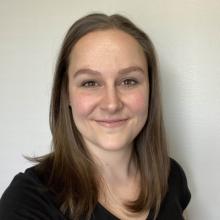Amie Orsetti
Why did you decide to pursue a graduate degree?
I knew early on within my bachelor's degree that I wanted to pursue graduate level education. I have had the opportunity to work on some incredible research projects, which sparked my interest in conducting my own research. Through completing my honours thesis, I developed an interest in processes of emotion regulation and wanted to continue research in this area in a graduate program. In addition to pursuing my research interests, I aspire to register as a clinical counsellor, for which graduate level education is required.
Why did you decide to study at UBC?
UBC offers a lot of potential to graduate students, and I was really drawn to the immense opportunities I knew would come with being a student here. The faculty experience, emphasis on research excellence, and reputation of the counselling psychology program were all very important in my decision to attend UBC.
What is it specifically, that your program offers, that attracted you?
The counselling psychology program at UBC has a really incredible reputation. I knew I would receive high-quality instruction from engaged faculty who are currently working in the field of counselling and could share insights their clinical experiences. I was also drawn to the emphasis the program places on developing a depth of skills in research as well as practice.
What was the best surprise about UBC or life in Vancouver?
The UBC campus is incredibly beautiful. I have enjoyed exploring all the buildings and finding spaces to sit or study. There is so much offered on campus that it really feels like when you are there, you have all that you need.
What aspect of your graduate program do you enjoy the most or are looking forward to with the greatest curiosity?
I enjoy the hands-on, practical nature of the program, as I think it will prepare me well for practice. I am looking forward to working in the clinic and completing a practicum to gain more experience with clients, as I think those will both be really incredible and impactful learning experiences.
What aspects of your life or career before now have best prepared you for your UBC graduate program?
I received incredible mentorship during my undergraduate degree which was central to my preparation for graduate studies. Through this guidance I was able to gain research experience both within my community and internationally. I was pushed to work hard and persist through difficulties. I was also encouraged to discover my own research interests and supported in developing them. Having others see and believe in my potential helped me to push myself and truly prepared me for success in my graduate program.
What do you like to do for fun or relaxation?
I love camping and exploring our beautiful province with my partner and our dogs.
What advice do you have for new graduate students?
Even though starting graduate school can be really busy and stressful, setting aside time to do things you love or that help you relax is important. If you can connect with supportive people in your life, like family and friends, it can also help to reduce the initial pressure you might feel. And, as much work as there is ahead of you, don't forget to reflect on what you have already achieved on your journey.
